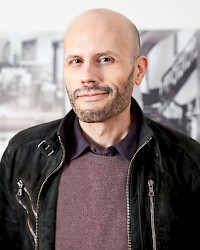Vita
Peter Skafish works between anthropology and philosophy on the question of what thinking is, both in and outside modernity. He holds a PhD in sociocultural anthropology from The University of California, Berkeley and is currently founding and directing a new research center called The Institute of Speculative and Critical Inquiry. He has held the positions of Maître de conférences associé at the Collège de France; Andrew W. Mellon Postdoctoral Fellow in McGill University’s Department of Anthropology; Fondation Fyssen postdoctoral fellow at the Laboratoire d’Anthropologie Sociale and the Collège de France; and visiting faculty at the University of California, Berkeley. In addition to writing the introduction to the English translation of Claude Lévi-Strauss’s De Montaigne à Montaigne and co-editing the book Comparative Metaphysics: Ontology After Anthropology, he has published essays in forums such as Angelaki, Common Knowledge, and Cultural Anthropology. He is also a translator, including of Catherine Malabou’s The Heidegger Change and Eduardo Viveiros de Castro’s Cannibal Metaphysics (both of which he also introduced) and is the Editor of a new the ISCI’s journal, set to launch in January, The Otherwise. He is currently completing the book Rough Metaphysics: Speculative Thought in an American Channel (An Anthropology of Concepts)
Dated from 2019
Fields of Research
Anthropological ontology, cosmopolitics, religion and secularism, outsider thought, planetarity, translation.
IKKM Research Project
Variations of Thought, Equivocations of the Body
The next step in ontological and cosmopolitical anthropology is to show not only that variations of thought can be incommensurate with that of modernity but also that there might be beings—and even modes of being—beyond those recognized by it. In part of a book manuscript that I am writing while at the IKKM, The Interpretation of Equivocations, I develop a case for why and how there can be ontic and ontological variability by examining “equivocations” that concern entities deemed merely symbolic and thus ultimately unreal by the sciences as well as the media by which those entities are accessed.
Initially, I do this by examining “equivocations of the body.” most specifically those engendered in modern thought by concepts from Chinese Medicine such as qi, “energy,” and mo, or “pulse.” Such concepts are of great interest because it is difficult to construe them, as sociocultural anthropologists and others did for most of the 20th-c., as symbolic and thus ultimately erroneous cultural representations of a human physical anatomy best known by modern biomedicine: Chinese doctors and others, such as qi gong practitioners, have learned, refined techniques for touching and affecting the referents of those signifieds, and are even able to produce a demonstrable curative effect on certain diseases recognized by biomedicine. Should the existence of those referents/entities be conceded, then there may very well be different strata of being than that of the physical universe recognized by the sciences, and they would likely be less formed than connected to by human practices.
At the same time, this possibility raises the difficult question of how extramodern, non-Occidental techniques—particularly when they are so “unscientific”!—might function as the media of access to those strata. The answer lies, I argue, in the way such techniques might indeed be veritable “technologies,” in that they (a) cultivate forms of embodied rather than prosthetic aesthesis that foreground diffuse, subtle, and often tactile perceptions rather than bring focus to and amplify their sharper counterparts; (b) affect in the entities thereby perceived causal processes that are more holistic and resonant than efficient and teleological. My point of departure here is a canonical piece of social theory, Marcel Mauss’s “Techniques of The Body,” which is the paradigmatic modern argument that arts of the body engender corresponding forms of habitus. Noting that Mauss often conceives the body primarily in mechanistic terms and thus does not appreciate the modes of perception and causality at work in some of the techniques, such as qi gong, at the center of his analysis, I reexamine these techniques in order to show that their successful practice hinges on perceiving and then causally augmenting processes, e.g. the flow of qi with the breathe, that in turn capacitates the individual to better feel and engage in those same processes and thereby enhances her skill in arts of other kinds (aesthetic, intellectual, ethical, etc). That the body is in this way not only the object but also the instrument of perception and causation of such techniques provides an initial, unexpected answer to my question: when recursively self-capacitated, bodies themselves are the mediating factors between human thought and the other, extramodern beings and possible strata of being.
Of course the above line of thought runs exactly counter to the various realist philosophies favored by the humanities today, from speculative realism to new materialism to neurophilosophy. I therefore am working on the beginnings of a metaphysical framework that might provisionally account for the existence of beings incompossible with those of modernity.
Selected Publications
“Structuralist Relativism for The Changes of the Cosmos,” introduction to Claude Lévi-Strauss, From Montaigne to Montaigne (The University of Minnesota Press, 2019).
Editor, with Pierre Charbonnier and Gildas Salmon, Comparative Metaphysics: Ontology After Anthropology (Rowman and Littlefield, 2016).
“Introduction,” to Eduardo Viveiros de Castro, Cannibal Metaphysics (Univocal, 2014).
